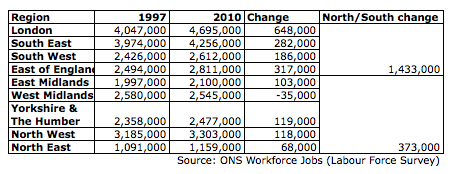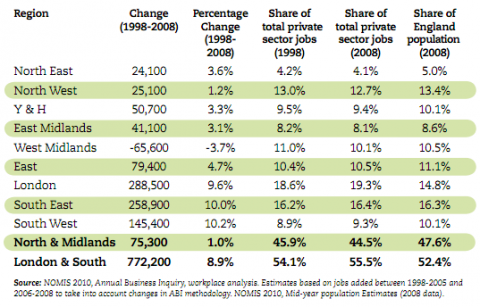Did the South create ten times as many private sector jobs has the North?
"Do you know one of the greatest scandals of the Labour years? For every ten jobs created by businesses in the south, just one job was created in the whole of the north and the midlands."
David Cameron, 11 April 2011
The Prime Minister yesterday kicked off Conservative campaigning ahead of May's local elections by telling party activists in Manchester that " the idea that somehow the Conservative Party isn't committed to the North West" was nothing more than a "myth".
To illustrate his point, Mr Cameron claimed that much of the growth in employment that had occurred under the last Labour Government had bypassed the north, with only one job being created beyond the Watford Gap for every ten jobs created in the south of England.
So is the labour market as grim up north as this startling statistic suggests?
Regular Full Fact readers will know that it is more difficult to pin down the number of "jobs created" over a given period than it might first appear. Politicians and newspapers commonly conflate changes in the number of people in employment and the number of 'new jobs' in the economy, when the two are slightly different.
However the Office for National Statistics does publish a measure of the total number of jobs in the UK, and provides a picture of regional labour markets. These show that whilst the growth in jobs available has been much steeper in London and the south, it doesn't appear to be of the magnitude described by the Prime Minister.
Even taking "south" in its widest possible sense, encompassing London, the South West, South East and even the East of England, the growth in the number of jobs tips the scales at 1.43 million, which is only four times more than the 373,000 jobs created in the north and the midlands.

To be fair to Mr Cameron, he does limit his claim to those jobs "created by businesses," which could be interpreted as movements in private sector employment only.
The ONS doesn't break down its regional employment data by private and public sector jobs. We've contacted the Conservative Party press office in an attempt to track down any alternative source for Mr Cameron's claim, but they've yet to provide us with one.
However data on regional private sector job creation is collated in the Annual Business Inquiry (ABI). Last year, the Centre for Cities think tank used this to calculate the disparity between the number of positions created in the south and those created in the north and the midlands. They did put the ratio at around 10:1.

So whilst this would seem to give the Prime Minister a solid foundation for his claim, it is nevertheless worth bearing in mind a couple of caveats. Firstly ABI data only covers the decade between 1998 and 2008, and so doesn't quite bookend Labour's years in office. This could be significant as the financial crash of 2008 could have had a knock on effect on employers in that sector, which are largely based in London.
Secondly, a fairer comparison may be between the percentage change in private sector jobs over the period, as the north and midlands and the south start with different stocks of private sector jobs in 2008. This reveals a very similar trend, but places the disparity in growth closer to a 9:1 ratio.
So whilst we hope to be able to iron out the finer details of Mr Cameron's claim once we've heard back from his party, it does seem that it at least built on solid foundation. Whilst the ten to one figure might refer to slightly dated information, the fact that the trend is supported to a lesser extent once public sector employment is factored in using ONS data can give us some confidence that the broader point made by the Prime Minister is accurate.